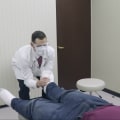When it comes to deciding whether or not to see a chiropractor, there are certain cases where consulting one is not recommended. Patients with herniated or bulging discs and those with arthritis may need advice from medical specialists before seeing a chiropractor. If there is a physical abnormality or injury to the body, such as a fracture, chiropractic care may not be suitable. If you have recently been injured and are experiencing a lot of pain and swelling, chiropractic adjustments may not be the most appropriate treatment at that time.
People who have osteoporosis or fragile bone density may need additional testing or support before receiving chiropractic care. It is best to consult with an orthopedic doctor before determining if chiropractic care is an appropriate treatment option for your injury or health condition. In the event of an emergency, you should go to the hospital or an urgent care center for immediate medical attention. Emergency room and urgent care doctors can address emergencies and help you stabilize yourself.
Once any immediate threats or concerns have been addressed, you can seek follow-up or ongoing care with a chiropractor you trust. It is always wise to talk to your doctor or chiropractor if you have any questions before starting any type of treatment, including chiropractic care. It is estimated that 85% of people experience back pain severe enough to see a doctor at some point in their life. However, despite how common it is, the precise cause of the pain is often unclear.
In addition, it is not known what is the best single treatment for most lower back pain. For these reasons, doctors' recommendations tend to vary. Standard care includes a balance between rest, stretching and exercise, warmth, pain medications, and time. Some doctors also suggest trying chiropractic care.
The good news is that no matter what treatment is recommended, most people with a recent onset of back pain get better within a few weeks, often within a few days. Studies that looked at muscle activity found that after a chiropractic adjustment, muscle activity was reduced by 25%. Working with 28 adult patients with scoliosis, they found that both the reported pain and the observed Cobb angle (a measure used to assess the magnitude of spinal deformities) had improved. Surprisingly, 28% of participants who were treated by a chiropractor reported that they did not feel pain at the end of the project.
A review of the literature on the condition highlighted a study involving 15 pediatric epileptic patients. The results showed that those who received regular chiropractic care had 200% more immunity than those who did not receive it. In conclusion, it is important to consider all factors before deciding whether or not to see a chiropractor for your health condition or injury. If you have any questions or concerns about your health condition or injury, it is best to consult with your doctor first before seeking out any type of treatment.



